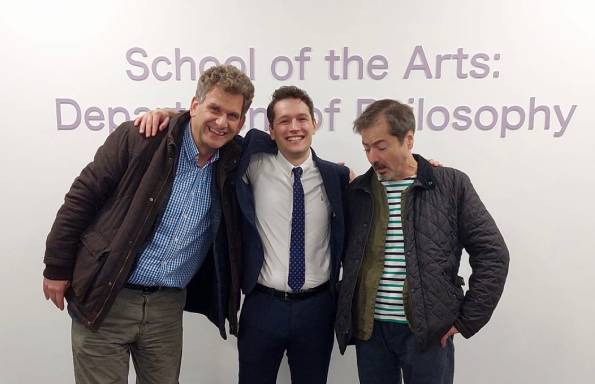Jack Symes and ‘The PhD Experience’

Jack Symes completed his undergraduate and masters degrees at the University of Liverpool. He returned in 2020 to complete his PhD in philosophy, which he was awarded in 2022. Jack is currently producer of The Panpsycast, editor of Talking about Philosophy, and researcher at Durham University. In this interview, we speak to Jack about his PhD experience.
Congratulations on being awarded your doctorate! Could you tell us about your PhD journey?
I started my PhD in January 2020. I spent the first two months presenting the structure of my thesis at conferences; I had just finished teaching at King Edward VI High School for Girls and was enjoying the opportunity to travel. Then, two months into my PhD, the pandemic hit.
How was your lockdown experience?
I had just relocated to Liverpool and, therefore, I got started on an (overly) ambitious apartment renovation. I spent most mornings sanding, painting, and getting electrocuted. I would fill my afternoons teaching, producing The Panpsycast and editing the book series. Then, on the evenings, once things had quietened down, I would read and write for my thesis. (Me and my partner also got very good at Call of Duty: WWII.)
My biggest challenge has always been writing; that was my main focus during lockdown. I would take my style guides to bed, study public communicators, and distract my supervisors and loved-ones with (naive) literary queries. That was probably the most valuable thing I learnt throughout my PhD. Learning how to write allowed me to produce my thesis and, with the publication of Philosophers on Consciousness, rewarded me with some generous appraisals. I still have a lot to learn… in fact, I often misspeel words and leave my sentences unfin–
How did things change after lockdown?
When I came back, the Department was relocating to its new home, Gillian Howie House. I found myself exactly where I wanted to be: at the heart of a department filled with passionate and interesting people. There’s a great atmosphere in the new building. Whether it’s Work In Progress meetings, Stapledon lectures, staff lunches, impromptu meetings, or drinks at the pub, there’s no shortage of insightful conversations. Liverpool is full of success stories – people collaborating with the BBC, leading exciting research projects, and publishing best-selling books – and there’s something to be learnt from each of them.
During lockdown, I had been teaching my classes online. It was great to be teaching in-person again. I increased my teaching at Liverpool and and joined the University of Chester as a visiting lecturer. Then, two years into my PhD programme, I was offered a position at Durham University. The offer included a teaching post and the opportunity to complete a second PhD. I prioritised writing my thesis over the summer. After my PhD defence, my Head of Department treated us to dinner and my PhD supervisor, Daniel Hill, ambushed me with champagne and a Haka.
What was the topic of your PhD thesis?
My research focused on ‘the evil-god challenge’, a newly popular argument within the philosophy of religion. The challenge is typically used as an argument against traditional monotheism – that is, religions who maintain the existence of an all-loving God. In short, the challenge states that it’s no more more reasonable to believe in a good-god than an evil-god and, therefore, the majority of religious believers are unjustified in favouring one (hypothetical) being over the other. The main proponent of the argument is Stephen Law, who was kind enough to serve as my external examiner.
What is your assessment of the challenge?
When I started my PhD, I thought that I would be defending the evil-god challenge as an argument against religious belief; in fact, I thought it was one of the best arguments against the existence of God. By the end of my PhD, I had changed my mind completely; now I think that the challenge can be defeated!
Have you continued to focus on this topic since your PhD?
I have! In fact, I have just returned from Tokyo where I presented my research as part of a conference on evil and suffering. My thesis is also forthcoming as a book; I’ll be spending the next few weeks making final tweaks and changes.
Do you have any advice for people starting their PhDs?
Everyone will have their own (unique) challenges. I suppose there are three things that I would say to my past-self.
Learn to write. You’re going to spend a lot of your time writing and, therefore, it’s worth thinking about what makes a good writer. I found guides to be the best place to start. I would encourage myself to pick up a copy of Dreyer’s English: An Utterly Correct Guide to Language and Style.
There’s no such thing as writer’s block. You’re going to need to write a lot. Don’t wait for inspiration to strike, just start writing. One of the most helpful books I read was Paul Silvia’s, How to Write A Lot. It’s a small book, but it’s worth it’s weight in gold. The take-home message: develop good habits and, most importantly, just write the damn thing.
Hit the beach. Liverpool is an incredible city, and the University is an excellent place to develop your ideas. However, I found that my most productive days were spent in the back of a camper-van. No coffee shops, no internet, no excuses: just forests, coastlines, and lots of notes.
What’s next for you?
I have just started teaching at Durham University and my new PhD research, as well as continuing with the production of The Panpsycast and organising some live events. Outside of that, I’m putting the final touches on two books: The Evil-God Challenge: A Response and Philosophers on God: Talking about Existence. Both of these will be out next year.